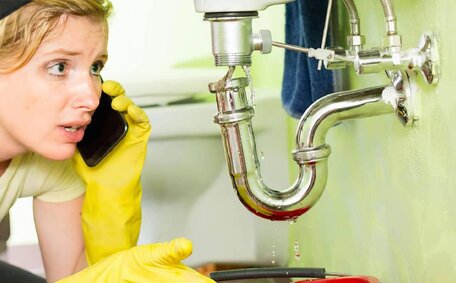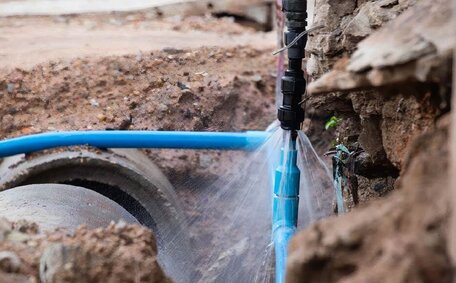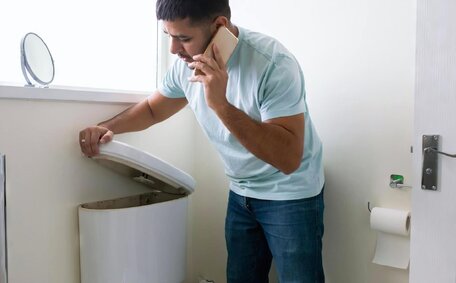Introduction to Pipe Materials and Vulnerability to Emergencies
In a plumbing emergency, the resilience of your water pipes can significantly affect outcomes. We, the plumbing specialists of Northmead since 2005, emphasise the importance of understanding how various pipe materials respond to common household emergencies.
We explore how freezing temperatures, corrosion, fires, and ageing impact plastic, copper, PEX, and stainless steel pipes. Readily available information on the vulnerabilities of pipes such as different types of pipe lets Northmead homeowners and businesses make informed decisions about new plumbing installations, replacements and general maintenance.
Our guide provides practical advice to protect piping in Northmead’s diverse climate. If disaster does strike, our 24/7 emergency plumbing services have the experience to handle any pipe repairs quickly and affordably.
Whether you’re concerned about bursting pipes in winter or leaky fixtures causing water damage, read on for our indispensable guide on pipe materials and emergency planning for Northmead homes and businesses.
Common Causes and Effects of Pipe Emergencies
Pipe vulnerabilities can arise suddenly, highlighting the importance for homeowners to understand associated risks.
Pipe freezing is the leading cause of pipe emergencies.
The expansion of freezing water in pipes can cause pressure-induced damage, a primary factor in property damage. This situation can easily lead to cracks and bursts, flooding a property when thawing occurs. Annually, frozen pipes cause significant property damage across the United States and Australia.
Corrosion from chemicals, minerals and oxygen deteriorates pipes from within, signalling maintenance needs. Thinning pipes are vulnerable to high water pressure, potentially causing cracks and leaks. Despite their size, pinhole leaks can lead to substantial accumulative water damage.
Physical damage from digging, drilling or remodelling poses a high-risk, often causing severe pipe emergencies. Even minor pipe punctures can result in costly repairs.
We advise Northmead homeowners and businesses to invest in high-quality maintenance and inspections to catch and address minor issues early. If disaster does strike, Northmead residents can rest assured that we’re here for support 24/7 to address any repairs promptly and affordably.
Comparing Durability of Pipe Materials
When selecting a type of piping, finding one that is also suitable for high durability is a key consideration for Northmead homes and businesses.
Plastic pipes, including affordable PVC options, resist corrosion but are sensitive to impact and temperature changes.
Copper pipes are corrosion-resistant and can exceed a 50-year lifespan with proper upkeep. However, copper is prone to pinhole leaks from chemical reactions and physical strikes. It also loses shape in hot climates.
PEX pipe’s flexibility and resistance to both freezing and scale buildup from hard water make it an appealing option. It’s also worth noting PEX easily cracks if nearby utilities shift soil. UV light also degrades PEX, so it must be shielded in outdoor uses.
Stainless steel pipes, withstand high temperatures and pressure variations, boasting a lifespan of over 100 years. It resists corrosion, pressure changes and high temperatures up to 850°F.
However, stainless steel is rigid and does not offer the easy install benefits of some other materials. The elevated cost also restricts residential uses.
For extremely hot places like water heaters, stainless steel is worth the investment.
Both copper and PEX offer considerable durability over time with proper maintenance.
Withstand Freezing: PEX vs Copper vs CPVC
Crosslinked polyethylene (PEX) piping stands out for its resistance to damage from freezing and bursting. The flexible tubing withstands expansion more effectively than copper and chlorinated polyvinyl chloride (CPVC).
With its elasticity, PEX can flex up to 30% without bursting, returning to its original size once thawed. CPVC gets extra brittle below 15°F while copper loses all flexibility below -100°F.
Copper and CPVC, both rigid in form, are more likely to crack when expanded from freezing due to their lack of elasticity.
PEX includes elements that render it suitable for high temperature scenarios, providing enhanced freeze resistance. With freezing points below -70°F, PEX plumbing pipes withstand Sydney’s average winter lows 25°F better than metal alternatives.
Hence, PEX pipes are increasingly preferred in Northmead’s plumbing systems over copper and CPVC. Proper insulation remains vital, and when comes to high-strain situations like polar vortexes or snowstorms, PEX is also suitable.
If you’re questioning what do about the pipe vulnerabilities in your Northmead home during winter storms, call us today. We can inspect your pipes and make freeze-damage prevention recommendations tailored specifically for your property.
Fire Resistant Pipes: The Benefits of Concrete
As wildfires intensify across Australia, concrete piping emerges as an invaluable safeguard for Northmead homes and businesses. Concrete’s robust composition and fire resistance protect water supply systems during urban wildfires.
Made primarily from noncombustible aggregates and cement, concrete piping withstands heat up to 2,000°F. It’s highly immune to ember damage, direct flame impingement, and destructive post-fire water flows.
Concrete also prevents contamination of drinking water systems after fires abate. In contrast to plastic pipes, concrete does not leach harmful chemicals into water post-flushing after wildfires.
With nearly one in six Northmead properties sharing a bushfire risk boundary, concrete piping guarantees climate resilience for essential plumbing even as fires worsen from climate change and urbanisation.
Professional guidance can tailor robust piping solutions to meet the specific needs of homes and businesses. Northmead Plumbing helps clients balance durability, sustainability and cost-efficiency whether confronting floods, fires or other disasters.
Preventing Frozen Pipes
Preventing frozen pipes should be a top winterization priority for every Northmead home and business. We recommend proactive insulation paired with vigilance during cold snaps to protect plumbing integrity.
Ensuring proper insulation is crucial, as it’s among the top deterrents against pipe freezing. Wrapping uninsulated pipes with pipe insulation reduces surface heat loss, especially in unheated areas like attics or crawl spaces. For colder regions of properties, thick fibreglass batt insulation over pipe runs adds another cold barrier.
Sealing air leaks around plumbing penetrations also prevents drafts from quickly freezing pipes. We recommend using spray foam or caulk at the main water line’s exterior entry point and any spots where pipes or wires pierce walls.
In cold spells, it’s wise to let faucets drip overnight to keep water moving and prevent freezing within the pipes. This prevents stationary hot cold water from freezing and expanding. Also open cabinet doors to allow indoor heat to reach exposed pipes and concealed pipes alike.
Maintain the property’s heating at or above 10°C even while vacant. Monitor both indoor and outdoor temperatures, alert to approaching freeze advisories. Catching a drop before pipes freeze lets our technicians implement auxiliary heating or winterization measures.
Don’t leave your home’s plumbing integrity to chance this winter. Northmead Plumbing’s pipe freeze prevention programme can provide custom protection suiting your property’s layout and risk factors. Call today to schedule pre-winter consultations with our friendly plumbers!
Safe Methods for Thawing Frozen Pipes
When pipes freeze, proper thawing technique is vital to avoid bursting or cracking. We recommend Northmead homeowners use safe, gradual warming methods to discover how thaw pipes effectively and restore flow.
Begin by turning off the water supply to the frozen pipes. This prevents refreezing or additional cracking once thawed. Turn on sinks to relieve pressure and drain remaining water from pipes.
Use a portable space heater, heating pad or hot water bottles to gradually warm frozen pipe sections, carefully avoiding open flames. Warm slowly over several hours, checking periodically until full water pressure restores. Limit thawing sessions to 20 minutes to prevent overheating untreated areas.
For rapid thawing, use a hairdryer on the low setting to avoid scalding risks. Concentrate heat application near the faucet area, working back towards colder sections slowly. This approach can restore water in under an hour if done carefully.
Once water starts flowing, inspect pipes and joints for cracks before restoring full pressure. Call Northmead Plumbing immediately about any leaks detected or for second opinions on pipe integrity. Allowing further use with compromised pipes risks serious flooding.
Emergency Response for Pipe Leaks and Bursts
When a major plumbing leak or burst occurs, immediate emergency response is crucial to prevent catastrophic water damage or service disruption. As Northmead’s trusted plumbing experts, we recommend homeowners take the following key actions while awaiting our urgent assistance.
First, identify and stop the water source.
Examine faucets, toilets, appliances, and outdoor spigots, while listening for the sound of water running behind walls, to locate the source. Shut off the main home valve near the metre to cut off water supply lines and halt overall supply. In the event of significant basement flooding, shut off the property’s water supply using the curbside valve.
In case of natural gas or liquid petroleum leaks, promptly shut off their main valves and ventilate the area to reduce explosion risk. Call the fire department for all gas leak assistance.
To control flooding, seal drains and place towels or barriers near the leak to contain the water. During leak management, wear rubber gloves and boots to safeguard against electrical hazards. If water levels surpass outlets, open windows and cut off the electricity at the breaker.
Thoroughly document any damage with photos or video as it happens. Such recorded evidence eases the insurance claim process and facilitates subsequent remediation. Avoid operating any electronics near water leakage until professionally dried and inspected.
Call Northmead Plumbing immediately about plumbing failures 24/7. Whether tackling flooded basements or slab leaks, our emergency plumbers have the experience, equipment and availability to resolve any water or gas crisis promptly. Contact us now at 1300 349 338 or jobs@northmeadplumbingservices.com.au for urgent assistance!






